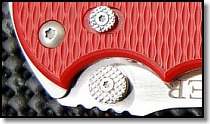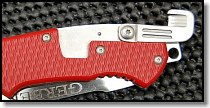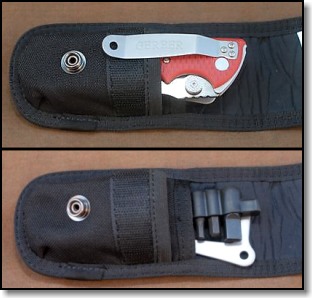

 |
 |
Editor's Note: When I first saw Gerber's new Hinderer Rescue Knife at SHOT Show 2006 I was impressed. Rick Hinderer is not only an accomplished custom knifemaker, he is also a professionally trained volunteer fireman and paramedic who has been doing this for over a decade. That experience seemed to be well reflected in the design. However, the only way to truly test this knife was to give it to a firefighter and paramedic who could test it in the unforgiving real world of fighting fires and rescuing people. I gave the knife to experienced ETS gear tester Alan Romania who is a very accomplished firefighter and paramedic at one of the busiest stations in the Phoenix metro area.
 I have been waiting to get my hands on the Gerber
Hinderer Rescue knife designed for Gerber by Rick Hinderer, who
happens to be a firefighter as well as a knife designer. There are many knives
and multi-tools that have been marketed to the firefighting, emergency medical
and rescue communities and few have lived up to their hype. Some knifes were
merely brighter colored versions of existing knives, other tried to incorporate
features that they thought firefighters and rescue workers may need.�While some were better than others, none of
the previous attempts at a knife for this community have met my expectations of
what a firefighter’s knife should be, so when I read Doug's initial review of the new knife I was hopeful but skeptical.
I have been waiting to get my hands on the Gerber
Hinderer Rescue knife designed for Gerber by Rick Hinderer, who
happens to be a firefighter as well as a knife designer. There are many knives
and multi-tools that have been marketed to the firefighting, emergency medical
and rescue communities and few have lived up to their hype. Some knifes were
merely brighter colored versions of existing knives, other tried to incorporate
features that they thought firefighters and rescue workers may need.�While some were better than others, none of
the previous attempts at a knife for this community have met my expectations of
what a firefighter’s knife should be, so when I read Doug's initial review of the new knife I was hopeful but skeptical.
The photos in the article didn’t do the knife justice. Once I finally got one in my hands it became obvious that a good deal of thought went into the design of this knife. Obviously, someone who has spent some time in turnout gear and riding backwards designed this knife.�
The Hinderer Rescue knife is not an everyday carry knife. It is too big and oddly shaped for comfortable pants pocket carry, but it wasn’t designed for that type of use. This knife is a mission specific tool, designed by a firefighter for emergency workers. The knife features a 3.5� blade that is serrated except for the tip.� The knife also features a window punch and a hook cutter for clothing. A small 9 piece tool kit and pouch are included. One of its most innovative features is a very simple cutout designed to be used as an oxygen tank wrench (and it works exactly as designed). You have to realize that oxygen wrenches seem to disappear in a fire station likes socks in a dryer!
 I have kept a number of different knives in my turnouts over the years, from high quality �rescue� knives to el cheapo gun show knives. None fit my needs. I have two basic uses for a turnout knife; first as a lifesaving tool for me and other firefighters, and second, as a general utility tool for rescue work. To fulfill these needs this knife needs to be able to accomplish three critical tasks:
I have kept a number of different knives in my turnouts over the years, from high quality �rescue� knives to el cheapo gun show knives. None fit my needs. I have two basic uses for a turnout knife; first as a lifesaving tool for me and other firefighters, and second, as a general utility tool for rescue work. To fulfill these needs this knife needs to be able to accomplish three critical tasks:
So, the first thing I did with the Hinderer Rescue Knife was go the station and start cutting stuff.� Everything I could get my hands on: rope (1/2� and 5/8� static rope), 1� webbing, seatbelt webbing, old turnouts, 1-3/4� double jacketed hose,� cardboard boxes, vinyl and pretty much anything else I could get away with destroying. The knife cut through everything without a problem. Even after cutting through sections of 1-3/4� hose a number of times the blade remained sharp enough to slice through a cardboard box with ease. This is a task any knife should be able to accomplish with ease and the Hinderer didn’t disappoint.�
After a few cuts, I went and got three pair of gloves: leather work gloves, mechanics/extrication gloves and turnout gloves.� I tried the knife with each pair of gloves. The knife has huge thumb studs on each side of the blade and the lock release is a simple round stud that slides backwards to unlock the knife (a ramp attached to the button actually moves the liner lock to release the blade).
 With no gloves on the knife is extremely easy to open and close one handed. With both the mechanics gloves and leather work gloves the Hinderer opened very easily, better than any other knife I have attempted this with. With the turnout gloves it was a little more difficult, but after a few practice runs I could get the knife to consistently open one-handed without dropping it. I have
never found a knife that I could consistently open one-handed with turnout gloves on--until now. I experienced no issues closing the knife one-handed with any of the gloves. The Hinderer Rescue operates as a true one-handed knife exactly as advertised.
With no gloves on the knife is extremely easy to open and close one handed. With both the mechanics gloves and leather work gloves the Hinderer opened very easily, better than any other knife I have attempted this with. With the turnout gloves it was a little more difficult, but after a few practice runs I could get the knife to consistently open one-handed without dropping it. I have
never found a knife that I could consistently open one-handed with turnout gloves on--until now. I experienced no issues closing the knife one-handed with any of the gloves. The Hinderer Rescue operates as a true one-handed knife exactly as advertised.
After cutting everything in sight I then moved on to test the knife's ability to pry. Typically, prying with a knife is not a safe task. The tip can easily skip or jump and the knife ends up lodged in the user.� The Hinderer Rescue Knife on the other hand was designed to pry. Featuring a dull and slightly rounded tip that is thinker on top for strength, the Hinderer makes a great tool for light prying.
To a firefighter, �light prying� means anything that doesn’t require a Halligan Bar or hydraulic ram. I started small; a paint can lid, a metal label that was glued onto a metal box, heavy staples in wood, wood pallet, and the rusted shut access panel to an air conditioning unit. It definitely worked better than a typical knife, though I would personally rather that the tip be ground with a square end, like a screwdriver ir pry bar. I was also able to make short work of a few interior doors, but again a flatter tip would have made this task easier.
 To test the hook cutter, I employed the assistance of our "new guy" and volunteered him to put on a pair of old uniform pants similar to jeans. The hook cutter is designed to cut through clothing without cutting the patient underneath; the back of the knife is flush with the cutter so all you have to do is drag is along the patient's skin and it will cut the clothing without cutting the patient. It worked as designed and was much quicker and easier to use for this task than the venerable trauma shears.� The cutout in the spine of the blade ensures you get a good grip without the blade interfering. On a some real life calls we were able to test this feature on motorcycle leathers, a pair of motocross boots, jeans, and leather boots. It cut through everything quickly and easily with little dulling. The Hook cutter doesn’t seem to hold an edge as well as the main blade, but it held up better than I expected after all we threw at it.
To test the hook cutter, I employed the assistance of our "new guy" and volunteered him to put on a pair of old uniform pants similar to jeans. The hook cutter is designed to cut through clothing without cutting the patient underneath; the back of the knife is flush with the cutter so all you have to do is drag is along the patient's skin and it will cut the clothing without cutting the patient. It worked as designed and was much quicker and easier to use for this task than the venerable trauma shears.� The cutout in the spine of the blade ensures you get a good grip without the blade interfering. On a some real life calls we were able to test this feature on motorcycle leathers, a pair of motocross boots, jeans, and leather boots. It cut through everything quickly and easily with little dulling. The Hook cutter doesn’t seem to hold an edge as well as the main blade, but it held up better than I expected after all we threw at it.
The first chance to test the window punch came on a call. One light swing and the window was gone. Once again, the cutout on the blade ensures you can firmly grip the body of the knife.
 One nice surprise was the nine-piece tool kit that was included with the knife.�It includes a small �L� shaped handle of flat metal, a bit adapter and nine 1/4" hex bits. The kit comes with a nice assortment of bits, but since they are standard
1/4" hex bits you can add whatever bits you may need. The �L� handle can be used with the bit on either leg, giving
both reach and leverage.�It also turned out to be a dandy tool for prying open doors. Don't know if that was meant to part of its the design, but it sure does work well for that. The whole kit fits inside the included pouch with the knife. prying open doors
One nice surprise was the nine-piece tool kit that was included with the knife.�It includes a small �L� shaped handle of flat metal, a bit adapter and nine 1/4" hex bits. The kit comes with a nice assortment of bits, but since they are standard
1/4" hex bits you can add whatever bits you may need. The �L� handle can be used with the bit on either leg, giving
both reach and leverage.�It also turned out to be a dandy tool for prying open doors. Don't know if that was meant to part of its the design, but it sure does work well for that. The whole kit fits inside the included pouch with the knife. prying open doors
�The ballistic nylon belt pouch that came with the Hinderer Rescue is a little bigger than I would want to wear on my belt, especially at work where I may have to put turnouts on over my duty pants.� I chose to initially wear the pouch on my turnout pant take-up straps. Since the pouch is designed to work with PALS webbing it easily attached to the take-up straps or microphone strap and it didn’t bounce up and down like most pouches I have tried.
I have since moved the knife to my turnout pant pocket, clipped inside the front of the pocket. The heavy duty clip is wide enough to keep it secure, so it is where you expect it to be every time. I choose to carry it this way so it was easier to access when needed and wouldn’t be covered by my turnout coat or SCBA (Self-Contained Breathing Apparatus). The tool kit was moved into a small ballistic nylon pouch that I had lying around, along with some additional hex bits.
All in all, I am very impressed with Rick’s knife.� It is not a knife for everyone, if you are looking for a everyday carry knife you need to look elsewhere. If you are a firefighter, rescue worker or EMS provider involved in rescue work however, this is the knife for you. It isn’t the cheapest knife on the market, but I was able to find it locally and online for much less than its MSRP of $115, in low seventy dollars range which isn't unreasonable considering its capabilities. It is worth every penny, in my opinion, and it has found a permanent spot in my turnouts.
Review by Alan Romania
|
| SELECT AND USE OUTDOORS AND SURVIVAL EQUIPMENT, SUPPLIES AND TECHNIQUES AT YOUR OWN RISK. Please review the full WARNING & DISCLAIMER about information on this site. |
Author: Alan Romania
Email: Alan Romania
Publisher and Editor: Doug Ritter
Email: Doug Ritter
URL:
http://www.equipped.org/hinderer_rescue.htm
First Published: September 12, 2006
![]()
Email to: [email protected]
|